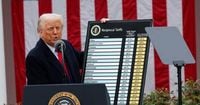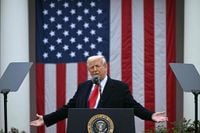In a dramatic escalation of trade tensions, President Donald Trump announced on April 2, 2025, a series of reciprocal tariffs on U.S. imports, with a minimum rate of 10% on all foreign products and a hefty 20% on goods from the European Union. These tariffs are set to take effect on April 5 and April 9, respectively, marking a significant shift in U.S. trade policy that has sent shockwaves through global markets.
The announcement has already begun to impact various sectors, with global stock markets experiencing notable declines. Following Trump's declaration, technology stocks on the New York Stock Exchange plummeted, with Apple suffering a loss of over 9%, Nvidia down 5.45%, and Dell dropping 16.96%. By the opening of trading on April 3, the Dow Jones fell by 2.81%, the Nasdaq plunged by 4.60%, and the S&P 500 dropped by 3.39%. In Paris, the CAC 40 index fell by 3.15%, signaling widespread concern among investors.
"This decision is a catastrophe for the world economy. It’s a huge difficulty for Europe, and I believe it’s also a catastrophe for the United States and for American citizens," said French Prime Minister François Bayrou during a Senate colloquium. The sentiment was echoed by Patrick Martin, president of the Medef, who described the tariffs as measures of "extreme gravity for the European economy." The French wine and spirits sector, which exports approximately 2.4 billion euros in grape wines and 1.5 billion euros in distilled beverages to the U.S., fears a potential decline of 800 million euros in exports due to the new tariffs.
While some sectors brace for impact, others are already feeling the repercussions. Stellantis announced it would temporarily close its Chrysler plant in Windsor, Canada, for two weeks due to the tariffs. The plant, which employs around 4,000 workers, produces vehicles that are heavily exported to the U.S. The automotive industry is particularly vulnerable, facing a 25% surcharge on imported cars.
In Switzerland, the government expressed shock at the 31% tariffs imposed on many Swiss products, stating it does not plan to retaliate in order to preserve commercial relations with the U.S. The Swiss economy is heavily reliant on exports, with 52.65 billion Swiss francs (approximately 54.97 billion euros) exported to the U.S. in 2024.
Trump, however, remains optimistic about the long-term effects of his policies. On April 3, he stated, "The United States will emerge stronger from this situation. The prognosis is that we will be much stronger, bigger, better, and more resilient than ever." His administration has characterized the tariffs as a necessary step to ensure fair trade practices, claiming that many foreign nations impose higher tariffs on U.S. goods.
The European Union is already preparing to respond to these tariffs. Jean-Noël Barrot, the French Minister of Foreign Affairs, indicated that the EU would retaliate as early as next week, potentially targeting American tech giants in response. Ursula von der Leyen, President of the European Commission, emphasized that it is not too late to negotiate and that the EU is ready to take retaliatory measures if necessary.
As the situation unfolds, various sectors are voicing their concerns. The agricultural sector, represented by Copa-Cogeca, has called for a de-escalation of tensions, warning of a potential trade conflict that could further destabilize the market. "These new tariffs will only increase uncertainty and financial pressure on our sector," the organization stated.
In the textile industry, Bangladesh is particularly worried about the tariffs, which they see as a "crushing blow". The country, which relies heavily on its garment exports, fears that buyers will turn to more competitive markets due to the increased costs associated with U.S. tariffs.
Amidst this turmoil, the dollar has also suffered, losing more than 2% against the euro, reaching lows not seen since September 2024. The euro surged to $1.1144, while the U.S. currency fell to $1.3189 against the pound. Investors are increasingly seeking refuge in government bonds, leading to a significant drop in interest rates.
As the global economy braces for the fallout from these new tariffs, leaders around the world are urging dialogue and negotiation. The Japanese government has raised concerns about the legality of the tariffs under World Trade Organization (WTO) rules, while the Chinese government has denounced the U.S. measures as "protectionism and intimidation". They have called for the immediate lifting of unilateral tariffs and warned of the consequences of a prolonged trade war.
In the midst of these developments, Emmanuel Macron has convened a meeting at the Élysée Palace on April 3, 2025, with representatives from affected sectors, including aerospace, agriculture, and luxury goods. The aim is to discuss the implications of the tariffs and strategize on how to mitigate their impact.
As the dust settles, analysts are predicting a significant negative shock for European activity, with many urging a reevaluation of trade partnerships. Philippe Waechter, director of economic research at Ostrum Asset Management, noted that the offensive will have a profound impact on the European economy and that it may be time to explore new partnerships beyond the U.S.
In conclusion, the ramifications of Trump's tariff announcements are already being felt across various sectors, with global markets reacting swiftly. As leaders navigate this complex landscape, the potential for a trade war looms large, raising questions about the future of international trade and economic stability.









